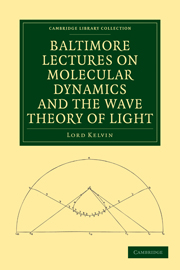Book contents
- Frontmatter
- PREFACE
- Contents
- ERRATA
- NOTES OF LECTURES ON MOLECULAR DYNAMICS AND THE WAVE THEORY OF LIGHT
- ADVERTISEMENT
- LECTURE I
- LECTURE II
- LECTURE III
- LECTURE IV
- LECTURE V
- LECTURE VI
- LECTURE VII
- LECTURE VIII
- LECTURE IX
- LECTURE X
- LECTURE XI
- LECTURE XII
- LECTURE XIII
- LECTURE XIV
- LECTURE XV
- LECTURE XVI
- LECTURE XVII
- LECTURE XVIII
- LECTURE XIX
- LECTURE XX
- APPENDIX A ON THE MOTION PRODUCED IN AN INFINITE ELASTIC SOLID BY THE MOTION THROUGH THE SPACE OCCUPIED BY IT OF A BODY ACTING ON IT ONLY BY ATTRACTION OR REPULSION
- APPENDIX B NINETEENTH CENTURY CLOUDS OVER THE DYNAMICAL THEORY OF HEAT AND LIGHT
- APPENDIX C ON THE DISTURBANCE PRODUCED BY TWO PARTICULAR FORMS OF INITIAL DISPLACEMENT IN AN INFINITELY LONG MATERIAL SYSTEM FOR WHICH THE VELOCITY OF PERIODIC WAVES DEPENDS ON THE WAVE-LENGTH
- APPENDIX D ON THE CLUSTERING OF GRAVITATIONAL MATTER IN ANY PART OF THE UNIVERSE
- APPENDIX E AEPINUS ATOMIZED
- APPENDIX F
- APPENDIX G HYDROKINETIC SOLUTIONS AND OBSERVATIONS
- APPENDIX H ON THE MOLECULAR TACTICS OF A CRYSTAL
- APPENDIX I ON THE ELASTICITY OF A CRYSTAL ACCORDING TO BOSCOVICH
- APPENDIX J MOLECULAR DYNAMICS OF A CRYSTAL
- APPENDIX K ON VARIATIONAL ELECTRIC AND MAGNETIC SCREENING
- APPENDIX L ELECTRIC WAVES AND VIBRATIONS IN A SUBMARINE TELEGRAPH WIRE
- INDEX
APPENDIX I - ON THE ELASTICITY OF A CRYSTAL ACCORDING TO BOSCOVICH
Published online by Cambridge University Press: 05 March 2012
- Frontmatter
- PREFACE
- Contents
- ERRATA
- NOTES OF LECTURES ON MOLECULAR DYNAMICS AND THE WAVE THEORY OF LIGHT
- ADVERTISEMENT
- LECTURE I
- LECTURE II
- LECTURE III
- LECTURE IV
- LECTURE V
- LECTURE VI
- LECTURE VII
- LECTURE VIII
- LECTURE IX
- LECTURE X
- LECTURE XI
- LECTURE XII
- LECTURE XIII
- LECTURE XIV
- LECTURE XV
- LECTURE XVI
- LECTURE XVII
- LECTURE XVIII
- LECTURE XIX
- LECTURE XX
- APPENDIX A ON THE MOTION PRODUCED IN AN INFINITE ELASTIC SOLID BY THE MOTION THROUGH THE SPACE OCCUPIED BY IT OF A BODY ACTING ON IT ONLY BY ATTRACTION OR REPULSION
- APPENDIX B NINETEENTH CENTURY CLOUDS OVER THE DYNAMICAL THEORY OF HEAT AND LIGHT
- APPENDIX C ON THE DISTURBANCE PRODUCED BY TWO PARTICULAR FORMS OF INITIAL DISPLACEMENT IN AN INFINITELY LONG MATERIAL SYSTEM FOR WHICH THE VELOCITY OF PERIODIC WAVES DEPENDS ON THE WAVE-LENGTH
- APPENDIX D ON THE CLUSTERING OF GRAVITATIONAL MATTER IN ANY PART OF THE UNIVERSE
- APPENDIX E AEPINUS ATOMIZED
- APPENDIX F
- APPENDIX G HYDROKINETIC SOLUTIONS AND OBSERVATIONS
- APPENDIX H ON THE MOLECULAR TACTICS OF A CRYSTAL
- APPENDIX I ON THE ELASTICITY OF A CRYSTAL ACCORDING TO BOSCOVICH
- APPENDIX J MOLECULAR DYNAMICS OF A CRYSTAL
- APPENDIX K ON VARIATIONAL ELECTRIC AND MAGNETIC SCREENING
- APPENDIX L ELECTRIC WAVES AND VIBRATIONS IN A SUBMARINE TELEGRAPH WIRE
- INDEX
Summary
§ 1. A crystal in nature is essentially a homogeneous assemblage of equal and similar molecules, which for brevity I shall call crystalline molecules. The crystalline molecule may be the smallest portion which can be taken from the substance without chemical decomposition, that is to say, it may be the group of atoms kept together by chemical affinity, which constitutes what for brevity I shall call the chemical molecule; or it may be a group of two, three, or more of these chemical molecules kept together by cohesive force. In a crystal of tartaric acid the crystalline molecule may be, and it seems to me probably is, the chemical molecule, because if a crystal of tartaric acid is dissolved and recrystallised it always remains dextro-chiral. In a crystal of chlorate of soda, as has been pointed out to me by Sir George Stokes, the crystalline molecule probably consists of a group of two or more of the chemical molecules constituting chlorate of soda, because, as found by Marbach, crystals of the substance are some of them dextro-chiral and some of them levochiral; and if a crystal of either chirality is dissolved the solution shows no chirality in its action on polarised light; but if it is recrystallised the crystals are found to be some of them dextro-chiral and some of them levo-chiral, as shown both by their crystalline forms and by their action on polarised light.
Information
- Type
- Chapter
- Information
- Publisher: Cambridge University PressPrint publication year: 2010First published in: 1904
